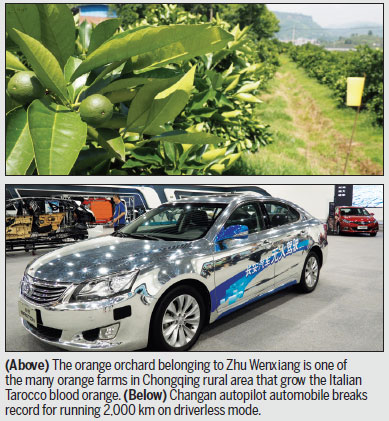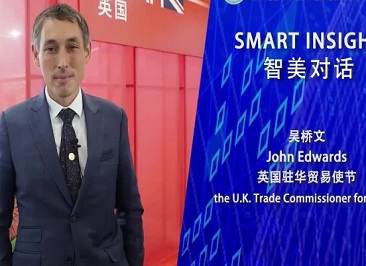Chongqing a key rail link with world trade
Shadow li in Chongqing
Updated:2017-07-28
HK Edition
Each day, train freight cars loaded with "Made in China" laptops, clothes, hats and mechanical machines pull out of Chongqing's railway station, bound for Europe. On the return trip are European automobiles, wines and a wide array of dairy products.
Chongqing - one of China's four municipalities directly under the central government and located in the southwestern region where the Yangtze River meets the Jialing River - is the starting point of the Chongqing-Xinjiang-Europe Railway, also known as Yu'Xin'Ou Railway, that links the sprawling metropolis with Duisburg in Germany. The 11,179-kilometer rail line passes through Xi'an, capital city of Shaanxi province, and Lanzhou, capital city of Gansu province, and enters Kazakhstan, Russia and Poland before arriving in Duisburg.
Tang Liangzhi, deputy Party secretary of Chongqing municipality, told Hong Kong and Macao journalists during a media tour of Chongqing that railway is the preferred choice for freight transport as it's safer and less expensive. It would take just 12 days to reach Duisberg from Chongqing - about one-third of the time taken by container ships - and costs only one fifth of the charges for airfreight.
So far, 21 mainland cities have followed Chongqing in exporting their goods by rail. The Yu'Xin'Ou Railway is the earliest to go into service, with the most frequent services and the biggest number of stops in countries along the route, according to Tang.
The route, which started operating on March 19, 2011, is part of a growing rail network connecting China and Europe along the "New Silk Road". Two years later, another freight rail from Chengdu, capital city of Sichuan province, to Lodz, Poland, also went into service.
According to official statistics, 279 freight trains carrying cargo worth a total of 18 billion yuan ($2.7 billion) to Europe had used the Chongqing-Xinjiang-Europe Railway last year - an increase of 25 percent over 2015.
Tang said the rail link not only serves to promote trade with other countries, it strengthens Chongqing's cooperation with the world in many areas, benefiting its service industry as well.
As the route expands, it will help boost Chongqing's sales, finance, accounting and law sectors, ultimately forming a full services system, he said.
It has also given a lift to many other inland industries, particularly in the field of information technology. Last year, 58 million laptops were manufactured in Chongqing, accounting for one-third of the world's laptop production and making Chongqing the world's biggest laptop manufacturing base.
Tang said the launch of the railway is also expected to further promote the Belt and Road (B&R) Initiative as it will become a vital link for advancing the China-led strategic project.
Imported European goods, after arriving in Chongqing, will be transferred by air to major Asian cities, including Bangkok, Hong Kong and Kuala Lumpur, further lowering transportation costs.
Jovic Hui Wa, general manager of Bank of East Asia (China) Ltd, who is a Hong Kong resident working in Chongqing, said Chongqing, situated at a key juncture of the (B&R) route, enjoys geographical advantages, as goods from the city can be easily transported to other destinations by road, air and water.
Hui said Chongqing's success in restructuring its economy has allowed the municipality to further develop its emerging industries, such as the finance and automobile sectors.
However, agriculture still plays an important role in Chongqing's economy, with its long day conditions and extensive area. The city's Wanzhou district is famous for its oranges and tangerines. It has orange groves covering about 360,000 hectares, producing 250,000 metric tons of the fruit annually with a value of 880 million yuan. One particular type of orange - which originates from the Tarocco blood orange in Italy and is known for its flavor - has been particularly popular in the market.
According to Zhu Wenxiang - who owns a farm growing such oranges, the current production capacity is still unable to meet demand. His farm has 800 hectares of the Tarocco blood orange trees.
Zhu said they have teamed up with Taobao - the online e-commerce platform of tech giant Alibaba Group - to market the oranges. About 1,500 boxes of the oranges were sold out within three days.
Zhu hopes that with increased production capacity, the oranges will be sold in Hong Kong through China Resources Vanguard, one of the major suppliers.
"We hope to have the fresh oranges delivered to Hong Kong next year, and maybe later to other parts of the world," he said.
stushadow@chinadailyhk.com

(HK Edition 07/28/2017 page11)
Video

John Edwards, the UK trade commissioner for China, praised Chongqing over its rise as a burgeoning center in intelligent manufacturing.





